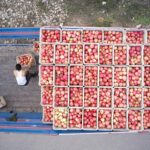U.S.: OTA launches "groundbreaking" organic fraud prevention program

The U.S. Organic Trade Associaton has launched what it describes as a "groundbreaking" Organic Fraud Prevention Solutions program, following numerous cases of conventionally-produced agricultural products found to have been incorrectly labeled and sold over recent years.
The organization said this was a "major step" by the organic industry to fight against fraud in the global organic system.
Organic businesses may now voluntarily pre-enroll in a program to help minimize or eliminate organic fraud both inside and outside of the U.S., it said. The new program is based on the OTA's Organic Fraud Prevention Guide that provides businesses engaged in organic trade with a risk-based process for developing and implementing organic fraud mitigation measures.
"Fraud in the global organic supply chain poses a significant threat to the integrity of the organic brand," said Laura Batcha, CEO and executive director of the OTA.
"For the past two years, the Organic Trade Association has prioritized significant time and resources into organic fraud prevention solutions. We are fighting fraud on many fronts, including through the 2018 Farm Bill and through private sector initiatives. The more companies that join this industry-driven program, the stronger the organic supply chain will be."
The global organic market is now valued at almost US$90 billion, with the U.S. market accounting for a little more than half, while organic imports to the country in 2017 rose 25% year-on-year to US$2.1 billion.
But in recent years investigations have revealed imported products fraudulently labeled as organic, as well as gaps in the complex organic supply chain, the OTA said.
The Organic Fraud Prevention Solutions establishes a "framework and formal process for businesses to create continuously improving internal programs for achieving organic integrity throughout their associated supply chains", according to the OTA.
It added that it requires training, an organic fraud vulnerability assessment and the development of an organic fraud prevention plan.
The enrollment process is integrated into the organic certification cycle and maintained annually.
The program is not a certification or verification program nor is it a product label. It is a quality assurance program designed to complement and reinforce USDA's organic standards and the work of the accredited certifying agencies.
"Everyone plays a role in preventing organic fraud," said Gwendolyn Wyard, vice president of regulatory & technical affairs for the OTA and staff coordinator for the association's Global Organic Supply Chain Integrity (GOSCI) Task Force, the 48-member task force formed two years ago to develop the fraud prevention program.
"It is critical that organic businesses have robust systems and measures in place that adequately support the promise of providing organic products that people can trust."







































